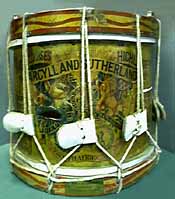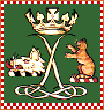Scottish History
The history of the Argyll and Sutherland Highlanders
The Regimental Museum in Stirling Castle
The Argyll and Sutherland Highlanders
1881 - 1918

Drum carried during the Boer war. Note the bullet hole. The drummer survived.
From 1881 to 1914 one of the Battalions served abroad whilst the other remained at home. The 1st Battalion served in South Africa, Ceylon and Hong Kong. They returned to the UK in 1892 before taking part in the Boer War in 1899 - 1902. They were joined in South Africa by the Reserve Battalion, the 3rd and 4th Battalions as well as the Volunteer Companies. After the Boer War they served in Malta and India.
The 2nd Battalion remained in the UK until 1892 when they moved to India. This was followed by service in South Africa before returning to the UK in 1910.

The Great War
When the Great War broke out in 1914 the Regiment had two Regular Battalions (1st and 2nd), two Militia Battalions (3rd and 4th) and five Territorial Battalions (5th, 6th, 7th, 8th and 9th each of which split into 1st, 2nd and 3rd-line Battalions). Seven more Service Battalions were raised for 'Kitchener's Army' and they were numbered 10th, 11th, 12th, 13th, 14th, 15th and 16th.
Ten of the Battalions served in France and Flanders (1st, 2nd, 5th, 6th, 7th, 8th, 9th, 10th, 11th and 14th) gaining 65 Battle Honours and four served in the Mediterranean area (1st, 5th, 6th and 12th) gaining a further 13 Battle Honours as shown on the push button displays in the centre of the room.
In the museum in the corner of the room is a model trench and command post which together with a commentary based on letters and diaries of Officers and Soldiers gives a vivid idea of what life in the trenches must have been like.
431 Officers and 6475 Other Ranks of the Regiment lost their lives during the war, a number that approximates to today's population of Oban, the largest town in Argyll. Six Victoria Crosses were awarded to members of the Regiment.
Illustrations:

Bible with embedded piece of shrapnel. It saved the life of 1772 Pte R. Wren.

Pocket watch which saved the life of 526 Corporal R. Watson in Salonika 1918

Men of the 2nd Battalion in the trenches.

Men from the 2nd Battalion in the trenches holding bombs made from tin cans.

Escorting a British convoy near La Brassée in April 1915 these three men from the Regiment beat off an attacking German patrol of 50.

